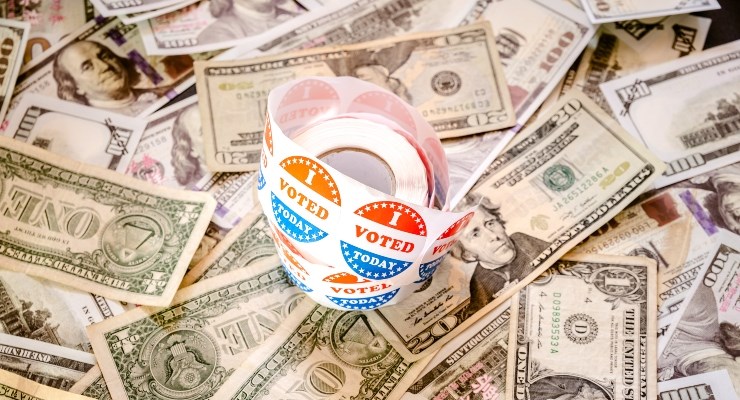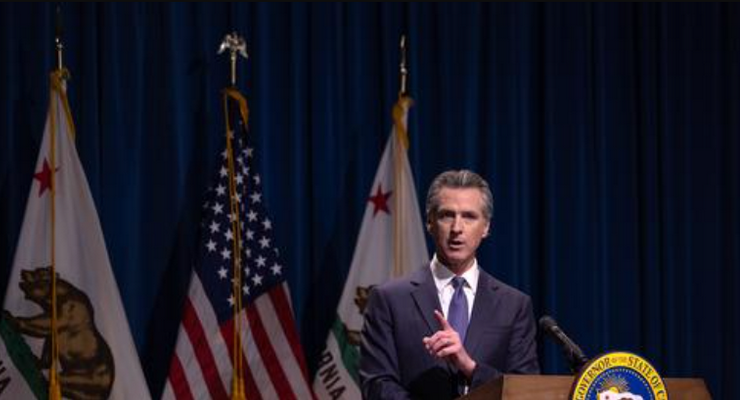This just in: We hate to break it to you so publicly, but you and your friends are just as gullible as you fear when it comes to outlandish news stories. In fact, according to Eugene Volokh, constitutional law professor at the UCLA School of Law, “Humans are wired for this sort of thing. We’re made for it.”
Volokh’s candid assessment of America’s mental zeitgeist was one of several points of view as KPPC “In Person” presented the discussion, “Fake News and the First Amendment: How to Tell Fact from Fiction,” at its Pasadena studios Tuesday evening.
The evening was moderated by KPPC host Alex Cohen, who presided over a panel consisting of David Snyder, executive director of the First Amendment Coalition; Mark Marino, associate professor of writing, USC; Jane Elizabeth, senior manager at the Accountability Journalism Program of the American Press Institute, and Volokh.
“Some people might see a story, and think, ‘Oh, that can’t be true,’ yet they still click on it and share it with their friends,” Volokh said.
“Fake news means a lot of different things to a lot of people,” said Cohen in her introduction to the evening, but as Marino noted, he teaches in his class that there are seven types of fake news based mostly on intention — Fantasy, such as “Bat Boy Found!”; Funny stories designed just to make people laugh, such as on The Daily Show, phony stories that clearly have no basis in fact, and are designed to mislead; and flat news, which is simply false with no intention of being funny, and finally, fake news which originates in Russia.
Or as former world chess champion Garry Kasparov, now chairman of the Human Rights Foundation, says, “There’s a Russian word for “fake news.” It’s “news.”
No, he wasn’t there. It just helps the story.
While the issue of “fake news” seems very timely, Elizabeth showed a page from a 1893 issue of the tabloid New York Herald which gruesomely detailed the escape of wild animals from the New York Zoo, including rhinos charging and old women being attacked. The point, said Elizabeth, was to illustrate the poor conditions at the zoo. “And people had no other sources,” she said. “There was only word of mouth, and newspapers.”
Volokh also noted that libel would be legally considered fake news, as would perjury, both of which are punishable by law.
“Much of the time,” added Elizabeth, “Journalists are simply motivated by pressure, the pressure of time and deadlines, and these days, by the number of clicks your story receives.”
Elizabeth also noted, however, that the proliferation of fake news has resulted in some journalists double and triple-checking their facts. “These days our metrics are better, also, and clicks don’t matter as much as they used to,” she added.
Snyder said that in his view, “Donald Trump has co-opted the term ‘fake news,’ and for him and others, it simply means ‘a story that I don’t like.’” And, ironically, he said, “reporting about fake news stories just elevates that fake news story.”
The panelists disagreed on some aspects of fake news — for example, the classic April Fool’s day fake news cycle, which Cohen hates, and Snyder loves.
“I’ve always dreaded that day,” said Cohen.
But, “All speech should be robust, wide-open and uninhibited,” Snyder said in opposition, quoting Supreme Court Justice William Brennan. “There should be as much speech as possible, “ he added, emphatically.
In a handout presented to guests at the event, KPPC offered some tips on how to spot fake news.
First, watch out for familiar-looking news websites whose web addresses end in “.com.co.” That’s an aberration of the genuine site, likely a fake news site designed to imitate the actual one. Check if other news sites are presenting that same story. Odd domain names generally mean untrue stories. As does no bylines on stories. Nothing in the “About us” section? Probably a fake site. The same holds true for amateurish web design and the use of all capital letters for emphasis in a story.
Finally, it’s always a good idea to read multiple sources of information to get a variety of viewpoints on a given story, and to help formulate your own opinion.
And stop clicking on everything.
This story is true.














 0 comments
0 comments


